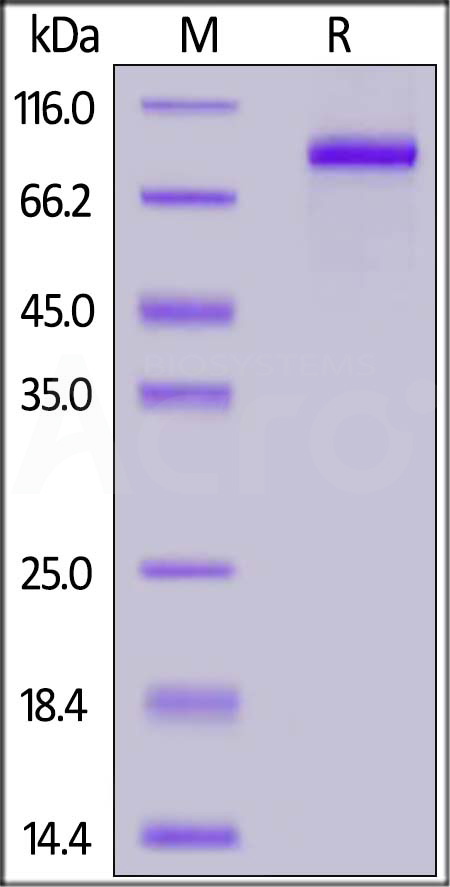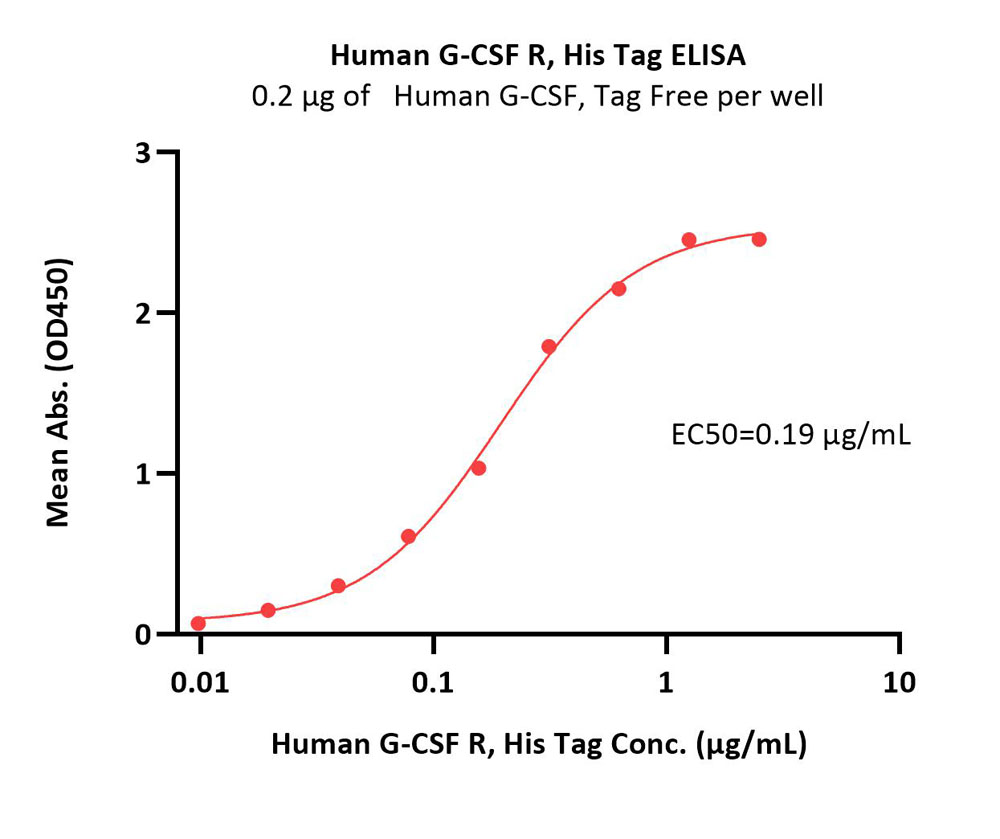分子别名(Synonym)
CSF3R,CD114,GCSFR
表达区间及表达系统(Source)
Human G-CSF R, His Tag (GCR-H5223) is expressed from human 293 cells (HEK293). It contains AA Glu 25 - Pro 621 (Accession # NP_000751.1).
Predicted N-terminus: Glu 25
Request for sequence
蛋白结构(Molecular Characterization)

This protein carries a polyhistidine tag at the C-terminus
The protein has a calculated MW of 67.4 kDa. The protein migrates as 80-90 kDa under reducing (R) condition (SDS-PAGE) due to glycosylation.
内毒素(Endotoxin)
Less than 1.0 EU per μg by the LAL method.
纯度(Purity)
>95% as determined by SDS-PAGE.
制剂(Formulation)
Lyophilized from 0.22 μm filtered solution in PBS, pH7.4 with trehalose as protectant.
Contact us for customized product form or formulation.
重构方法(Reconstitution)
Please see Certificate of Analysis for specific instructions.
For best performance, we strongly recommend you to follow the reconstitution protocol provided in the CoA.
存储(Storage)
For long term storage, the product should be stored at lyophilized state at -20°C or lower.
Please avoid repeated freeze-thaw cycles.
This product is stable after storage at:
- -20°C to -70°C for 12 months in lyophilized state;
- -70°C for 3 months under sterile conditions after reconstitution.
质量管理控制体系(QMS)
电泳(SDS-PAGE)

Human G-CSF R, His Tag on SDS-PAGE under reducing (R) condition. The gel was stained with Coomassie Blue. The purity of the protein is greater than 95%.
活性(Bioactivity)-ELISA

Immobilized ActiveMax® Human G-CSF, Tag Free (Cat. No. GCF-H5214) at 2 μg/mL (100 μL/well) can bind Human G-CSF R, His Tag (Cat. No. GCR-H5223) with a linear range of 0.01-0.313 μg/mL (QC tested).
Protocol
 +添加评论
+添加评论背景(Background)
Granulocyte Colony Stimulating Factor Receptor (G-CSFR) is also known as Cluster of Differentiation 114 (CD114), CSF3R and GCSF, is a cell-surface receptor for the granulocyte colony-stimulating factor (G-CSF), a cytokine that plays a critical role in the regulation of the activation, proliferation, differentiation, and survival of the neutrophilic granulocyte lineage. G-CSFR belongs to a family of cytokine receptors known as the hematopoietin receptor family. This type I membrane protein has a composite structure consisting of an immunoglobulin(Ig)-like domain, a cytokine receptor-homologous (CRH) domain and three fibronectin type I II (FNIII) domains in the extracellular region. G-CSFR is present mainly on precursor cells in the bone marrow, and, in response to stimulation by G-CSF, initiates cell proliferation and differentiation into mature neutrophilic granulocytes and macrophages. G-CSFR mediates the specific effect of GCSF through activating a variety of intracellular signaling cascades, including the Jak/Stat, PI3/Akt, Ras-Raf-MAP kinase, and Src family kinase pathways, and thus functions in defense against infection, inflammation and repair, and in the maintenance of steady state hematopoiesis. Mutations in this gene are a cause of Kostmann syndrome, also known as severe congenital neutropenia. Mutations in the intracellular part of this receptor are also associated with certain types of leukemia.























































 膜杰作
膜杰作 Star Staining
Star Staining









 Loading ...
Loading ...




